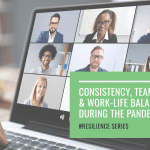STEPPING INTO 2021 WITH INTENTION
The world-renowned psychiatrist and trauma expert, Dr Bessel Van Der Kolk, a few years ago asked the audience during a lecture what they noticed about an image of the burning twin towers in New York. The image was of Manhattan city dwellers reacting to the attack on the buildings behind them. What Dr Van Der Kolk wished to highlight was that despite the location of the danger, each city resident was running in separate and different directions. They were all running home. Running to their families and spaces of individual security.
Over the last four months, the global pandemic has seen most people and businesses literally shelter in the same place of safety; home. Articles aimed at highlighting the prolonged psychological impact of the pandemic are beginning to fly; as are new click-bait conditions such ‘re-entry anxiety’. For those in charge, a key part of the ‘back to business’ puzzle might be to understand that the world in many respects has been traumatized by the ongoing uncertainty and vortex of fear that has engulfed so many of us.
After any crisis or disaster, it’s very usual to have a period of debrief. To ask each other ‘What has this been like for you?’ and ‘How has this made you feel?’. A person’s experiences will remain unprocessed, potentially in a harmful way, until the opportunity for the experience to be expressed arrives. Right now leaders, HR departments and business owners have an opportunity to start asking the right questions, take pro-active, person-centered action and avoid the pitfall of blind-eyeing what may really lurk beneath.
What have we learnt about ourselves over the last three months?
This article is inviting you to take a moment to reflect on your own journey, and that of your business over the past few months. We have all been in unprecedented times of challenge and hopefully learning. Agility measures our ability to learn from experience but most importantly, to embed that learning into action and therefore improvement. It may be helpful to consider the following questions in order to orientate our discussion:
- What has been the impact of fragmentation within your business during Covid-19?
- Are you now ready to reunite for success?
- What do you want to leave behind, and what must you secure to take with you?
- Have you managed to maintain a sense of belonging & affiliation across teams?
- Do we have enough ‘glue’ to hold you together for the future?
- How well do you understand the impact of this time for each employee?
- As leaders, how proactive how you been in hearing the voices and fears of those you have responsibility for?
- Would you like a structured approach that enables voices to be heard, lessons assessed, and powerful changes made?
As weeks move into months, the impact of a lock-down scenario has become a temporary ‘normal’ for many. In the first instance, both nationally and globally, we received mixed messages from those we entrust to make the important decisions on our behalf. It seems that the more open line of messaging was to ensure we take precautions, be sensible but ‘stay safe’ and calm, whilst the unconscious narrative being played out was that we ought to, at least metaphorically, run for the hills.
As time has passed, and despite the traumatic and harrowing amount of suffering many families have had to ordeal, for the most of society we have become more grounded in the knowledge that the world keeps turning and most of us are still here to fight another day. People are beginning to emerge from the trenches. Some with extreme caution but others with a sense of gusto, running into no-man’s land, raring to be set free.
Covid-19 has fragmented many sections of society. From families to classrooms, the workplace and sports clubs. We hear mutterings of this being the ‘new normal’ but how do we know? Who gets to decide? Many love the idea of a flexible working arrangement between home and the office, yet others are chomping at the bit to get back to the office and the land of the familiar.
We’ll soon find out if football is the same without the fans or if there’s any point in a Starbucks if our coffee is accompanied by yellow and black hazard tape or the scenery is forever a carpark. What is for certain is that the fragmentation Covid-19 has caused needs time to heal. The wounds may not be fully visible yet as this type of fragmentation can ripple throughout every aspect of a system whose deeper vibrations might not be felt for some time. As with any trauma, it’s nearly always the calm time after the intensity of the incident where the toxicity is discharged. Perhaps with many months in between.
For some going to work is simply a job. A way of making ends meet, month in month out. But for many a job is much, much more. Being at work is a part of who we are and a symbolic representation of our identity. What might happen perhaps, if the honeymoon period of flexi-home working wares off and we become tired of mixing our chrome book with our cornflakes? How productive and purposeful might we feel if we never have the need to remove our slippers? A part of a meaningful life is to find purpose and for many this purpose resides in climbing the hierarchy of competence within a group. We often like to sense we belong to a group on an inter-personal level. We may wish for our growth to be witnessed and acknowledged. We literally, neurologically speaking, thrive from being in close physiological connection to one another. We learn in this way and we regulate each other’s mood and well-being.
As leaders, bold enough to rise to the challenge of post-Covid working as the anointed ‘tribal elders’, we are faced with fresh challenges that our previous experiences haven’t encountered. We may have just about steered our group through the choppy waters of uncertainty but at a deep level we know our crew members have been affected by the struggle. May it be of utmost importance to ensure the system, both individually and as a group are given the opportunity to be heard? To feel-felt? To feel that the individual internal experience is to be held in mind and with value?
Some key questions leaders could be asking:
- How can leaders promote a sense of safe-guarding and prevent re-traumatisation from the system itself? How can employers create a ‘place of psychological safety’?
- How can business get up to speed on what’s going on for the people they need to protect by enhancing their emotional well-being?
- How can leaders prevent burying the trauma for employees and indeed themselves?
- What are we modelling as leaders? Are we asking – how has this been for you?
Denison Survey of Testing Resilience following Covid-19
Over these past few months, as the world of work has been disrupted like never before, Denison has been working with companies who are eager to understand how their workforce has adapted to the COVID-19 Pandemic. As organisations struggle to keep their people safe, adjust to working from home, and accommodate the massive changes in the business environment, these results have helped Denison Consulting provide useful information to guide their client’s actions.
Denison Consulting has now completed projects with 36 organisations and over 15,000 respondents and have some interesting patterns emerging. Denison designed a set of questions to learn more about companies’ responses to the pandemic.
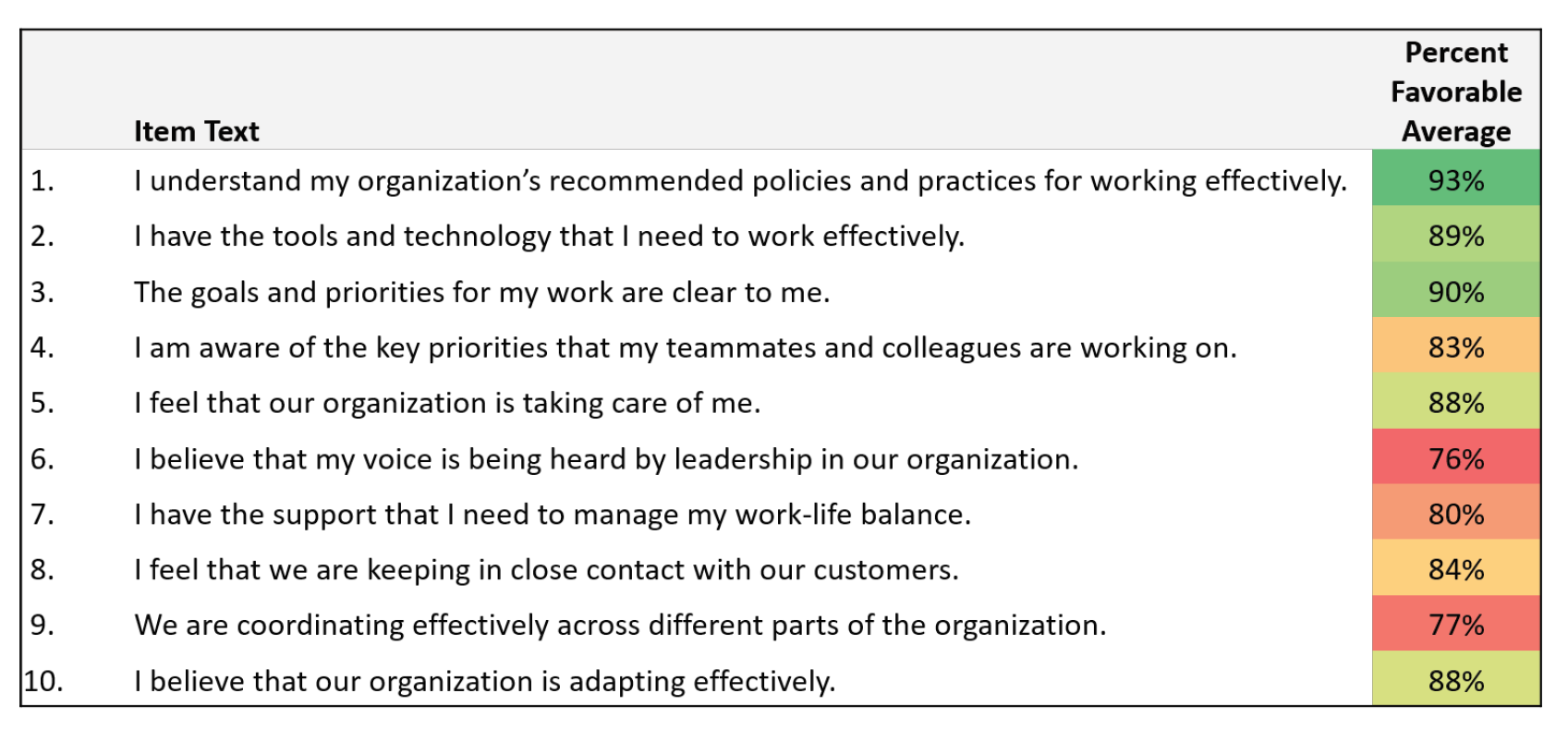
Our research shows that most of the companies that have chosen to do our resilience assessment were not average – they are mostly organisations that have very positive cultures to begin with, and their response to the pandemic has reflected that positive culture. With results from 4554 individuals in the first 24 organisations, the results are shown above.
There are some valuable lessons here. Overall, people seem to understand their organisation’s policies & practices, and feel that they have the tools and technologies that they need to do their work. They also understand their goals, and are aware of the activities of their colleagues and teammates. They keep in close contact with their customers, and feel that their organisation is adapting effectively and taking care of them.
It is also very interesting that the most significant cultural strengths of the high resilience firms are a high level of agreement, and a clear set of goals and objectives. We were actually a little surprised to see that the firms who took our resilience survey were not especially high on Core Values – that was actually the lowest culture score with a percentile score of 59.
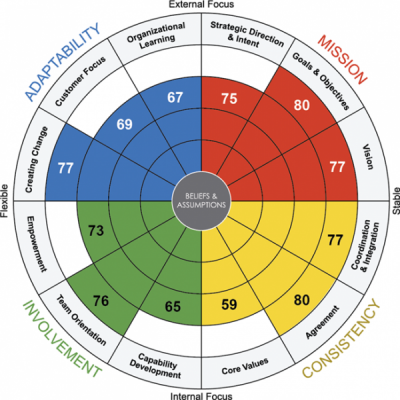
If you were to complete this no charge Resilience Assessment in your own company, what might you discover?
Please follow the link if you wish to explore this possibility.
Denison Model to Building a Great Culture
How might a measure of subconscious beliefs and assumptions about ‘the way things are done around here’ be of value as leaders look to not only ‘rebuild’ but to hand carve a ‘new normal’ using the best, most accurate information from the people who matter the most – their own team and workforce, and the system itself.
May we suggest a structured and systemic approach to managing this challenge.
The Denison model of Organisational Culture (DOCS) highlights four key traits that an organisation should master in order to be effective. At the centre of the model are the organisation’s ‘Beliefs and Assumptions.’ These are the deeply held aspects of an organisation’s identity that are often hard to access. The four traits of the Denison model, Mission, Adaptability, Involvement and Consistency, measure the behaviours driven by these beliefs and assumptions that create an organisation’s culture.
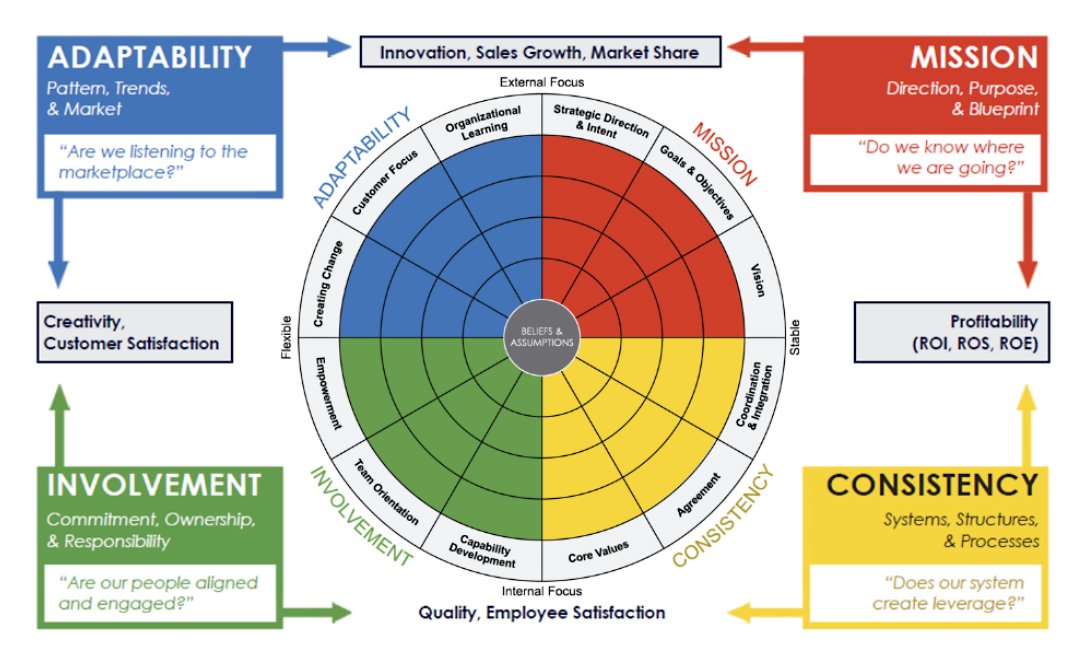
These traits are organised by colour and are designed to help you answer key questions about your organisation.
- Mission: Do we know where we are going?
- Involvement: Are our people aligned and engaged?
These are dynamic tensions that need to managed in order for each employee to understand their personal contribution to the strategic priorities. - Adaptability: Are we responding to the marketplace/external environment?
- Consistency: Do we have the values, systems and processes in place to create leverage?
The dynamic tension here is between understanding your market and how your systems and processes facilitate the needs of it. Here we can explore the question, are we set up in a way that enable us to keep the promises we make to our customers?
Each trait breaks down into three indexes. For example, Adaptability breaks down into Creating Change, Customer Focus and Organisational Learning. Each index is made up of four statements, for a total of 48 items, on the survey. Each of the four traits is represented by a colour on the circumplex model. This colour coding helps to group the related constructs into the four traits and also helps provide visual and intuitive feedback in the reports.
Denison’s research has demonstrated that effective organisations have high culture scores in all four traits. Thus, effective organisations are likely to have cultures that are adaptive, yet highly consistent and predictable, and that foster high involvement, but do so with the context of a shared sense of mission. This diagnostic has enabled organisations to pin point their strengths and challenges in a way that enables honest conversations to be created efficiently but with significant impact for the business. See below a real example of the impact that can be made when senior leaders take culture change seriously.
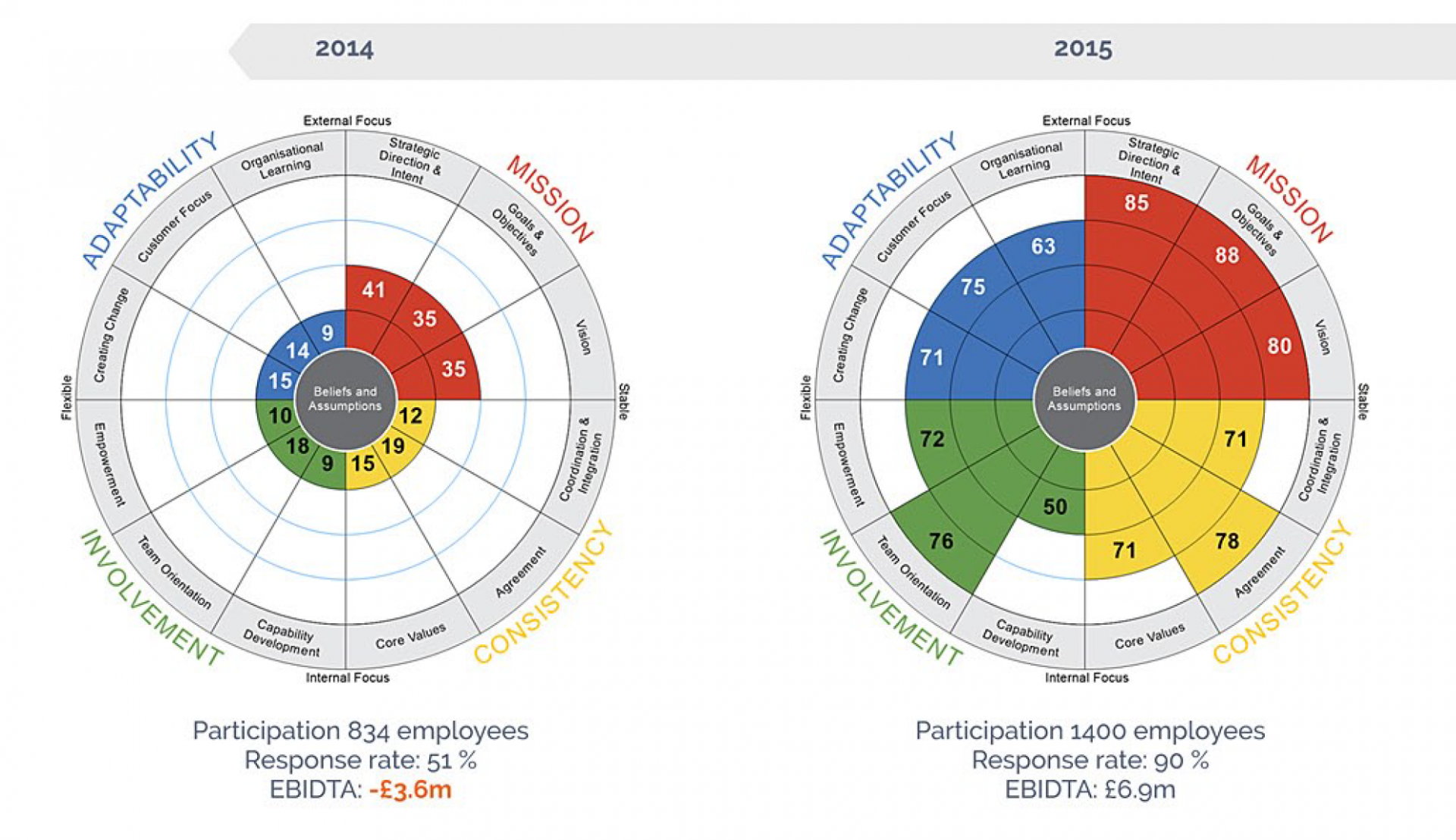
Where have we managed to arrive to now, and how the hell did we get here?
We invite you all to take a moment to reflect upon your own journey over the past few months, and if helpful consider these questions:
- How inclusive and structured was your process for the decisions you took?
- What have you learnt about your markets and customers during this time?
- How ‘agile’ are you, was adaptation easily or a real challenge?
- Who has emerged as role models and inspired characters?
- How are people adapting as their normal symbols & rituals disappear, does it matter?
- Can you define the ‘new normal’ and how it impacts employees and the business?
- How prepared will you be if a second wave hits?
The News on the Street from Charlie Bennett – Consumer Goods Recruiter
In our experience to date businesses are ‘reframing’ this unprecedented experience of Covid19 as an opportunity to stress test their businesses. For most, they appear well beyond flight or fight, with many now calmly strategizing a way forward. For Charlie who works closely with leaders in the world of consumer goods they are now having to consider:
- Do we have the right people?
- Are they pointed in the right direction?
- Are we properly aligned for our routes to market
- Is our online strategy effective?
- Does it enable us to maintain profits?
- Do we need to maintain our expensive offices and what might be the consequences if we decide not to, or would a blended approach work just as well?
Getting all this right requires strong, well informed and decisive leadership. How well informed are leaders able to be right now, is another crucial question? Are decisions being taken from intuition or solid data? Clarity and alignment from the senior leadership team will be essential to ensure the business is pointing in the right direction by Q4. As we are in uncharted waters the answers to those questions might not be straightforward. We don’t have all the data and information because it doesn’t exist, or it is constantly changing. Which means that the best way forward is to craft ongoing solutions that can be flexed. If you like an artisanal approach rather than a rigid migration back to “normal.” The ship “Normal” sailed three months ago.
Managing talent, has been impacted by this period of ‘stress testing’ as many businesses have discovered they can achieve their business objectives, with fewer people, or the same number of people just realigned to account for new trading conditions. As the world of recruitment changes senior management will need to insure, they are able to identify and pick up the great talent that would not normally be on the market. For some this is counter intuitive as it is an additional cost in a time when many are trying to protect profits. However, if they can make budget available then that investment will be well rewarded as it is always the best people that create the most resilient cultures and thus the most successful businesses.
We invite you to assess your current state of Resilience and ensure you are focused on what matters most for your business right now and the future to come.
Or email kjones@denisoncultureeurope.com / with reference CDP in your message to discuss your own assessment at no charge.
About Denison Consulting:
Denison Consulting, which has its European headquarters in Weinfelden (Switzerland), is a global consulting company that supports organizations through customer-focused, innovative culture change and leadership development solutions. Denison Consulting is one of the world’s leading experts in linking organizational culture, change and leadership with financial results. More information can be found at www.denisonconsultingeurope.com.

